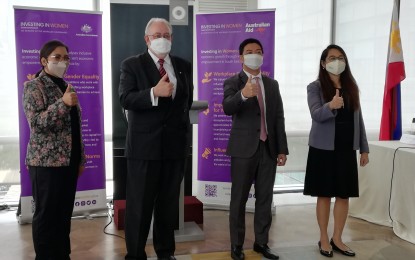
(L-R) InBest's Benilda Ronquillo-Camba, Australian Ambassador Steven Robinson, Macquarie Group Manila Technology and Office Head division director Eric Yaptangco, and FSSI's Christie Rowena Plantilla during the launch of the Investing in Women RISE Fund in the Philippines. (Photo by Joyce Ann L. Rocamora)
MANILA – The Macquarie Group Foundation, in partnership with the Australian government, is investing more than PHP43 million to support women-led small and medium enterprises (SMEs) in the Philippines and help offset the pandemic's impact on their businesses.
The Macquarie-Investing in Women RISE Fund in the Philippines, the first in Southeast Asia, was formally launched on Tuesday in Makati City.
Macquarie Group Manila Technology and Office Head division director Eric Yaptangco said the funding reaffirms the group’s commitment to contribute to the success of women-led enterprises as well as in the country’s recovery efforts amid the pandemic.
“This really signifies Macquarie’s commitment to the Philippines,” Yaptangco said. “We will continue to contribute to its ongoing growth and recovery from the Covid situation.”
To extend the funding to Filipina-led businesses, the Investing in Women RISE Fund partners with the Foundation for a Sustainable Society Inc. (FSSI) and InBestCap Ventures (InBest).
“As we move forward with this RISE Fund, we will be able to provide opportunities for the Foundation to get even stronger and let our women-led businesses not just to flourish, but excel and succeed,” Yaptangco added.
The project seeks to sustain over 200 women with full-time jobs in the next two years.
At FSSI, the program will be implemented through financial assistance, capability building, and joint venture with other social enterprises, where an SME may access more than PHP100,000 based on its needs.
"We will make sure that it will be distributed in all the regions of the Philippines, it will not just be focusing on the rural sector or in one part of the country," FSSI representative Christie Rowena Plantilla said.
InBest, meanwhile, will consider the cash flows and the growth plans of the enterprise who will apply.
"The maximum will be PHP15 million and more depending on the need of the SME," InBest's representative Benilda Ronquillo-Camba said.
'Central role'
Australian Ambassador to the Philippines Steven Robinson said the public-private alliance would help allow women to play a "central role" in the country's path to pandemic recovery and boost their businesses to help build back a "better Philippines".
"The whole idea is by putting money into this because women's businesses are generally so productive, we hope to see something like a five to 15 percent return on the investment that's been made," he said.
"Closing the gap between women's and men's access to capital will provide a significant boost to economic growth at a time when it's much needed," he added.
After two years, Robinson said Australia will look at the initiative's success and determine whether to invest more.
"We'll see how it will go over the next year, this is one of the things that we do with programs like these, to evaluate it continuously. The next year or so, we'll look at how it's going and if there's an opportunity to invest further, we'll be very keen to do so," he said.
Australian Ambassador for Gender Equality Julie-Ann Guivarra, on the other hand, is optimistic the initiative would draw even more private investment into the region in support of women's economic empowerment.
According to the International Finance Corp., 70 percent of women-owned SMEs in the formal sector in developing countries like the Philippines are unserved and under-served by financial institutions.
For East Asia and the Pacific region alone, the financing gap to women-led SMEs reached USD68 billion dollars.
Mckinsey Global Institute’s research shows that an estimated USD12 trillion could be added to the global gross domestic product by 2025 by advancing women’s equality. (PNA)
